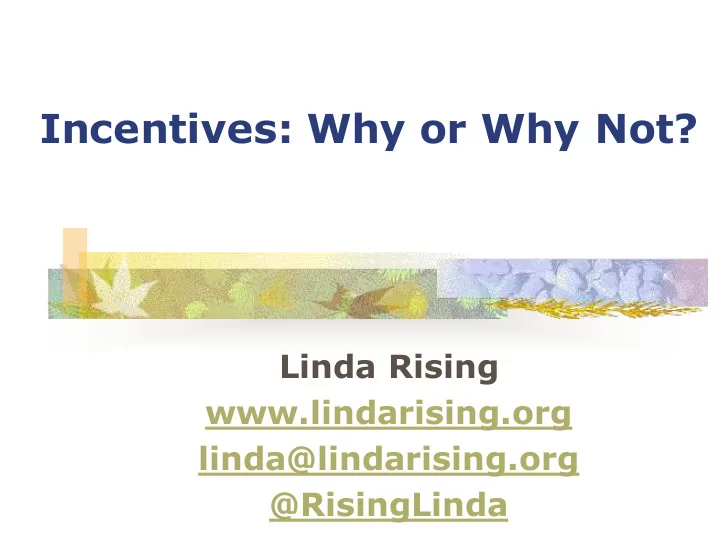

Incentives: Why or Why Not? Linda Rising www.lindarising.org linda@lindarising.org @RisingLinda
Why ask this question? Russian scientist Ivan Pavlov (mid-late 1800s) showed animals could be trained to anticipate reward on the basis of cues. This approach (behaviorism) would dominate Western psychology for the next 50 years. Using carrots and sticks to get desired behavior still persists.
Pavlov’s Famous Dog
Who is this guy?
Frederick Winslow Taylor
“Work consists of mainly simple, not particularly interesting, tasks. The only way to get people to do them is to incentivize them properly and monitor them carefully.” Pretty much true in the 1900s – but now?
Why do we still follow Taylorism? n Many managers still believe in Taylor’s notions of efficiency, finding the “best” way to perform a task. n We buy into it when we feel guilty for daydreaming or not working heads down for long periods of time L ! (A plug for my Thinking tutorial J !)
Enter Harry Harlow Experiment in 1949 with rhesus monkeys. Performance of the task was its own reward – “intrinsic” motivation. Big shift from biological and extrinsic motivation. Further experiments showed that giving rewards decreased motivation. Results ignored by scientific community for TWO DECADES L !
Kahneman & Tversky Their “prospect theory” in 1979 lead to the creation of behavioral economics.
Ultimatum Game Pair of subjects, S1 and S2 S1 has money, e.g. $10 and can offer S2 a part of it S2 has right of refusal. If offer not accepted, neither subject gets anything. Our behavior is not always “rational.” We are concerned with “fairness.”
Fairness Counts – even with monkeys J ! Grape and cuke.flv
Benefits(?) of incentives In a program sponsored by Pizza Hut that promises free pizza to children to induce them to read, children were likely to pick short, simple books, plow through them quickly rather than coming to appreciate the pleasures of reading. Teresa Amabile - HBS
Unintended consequences Fat kids who don’t like to read.
Tangible rewards undermine intrinsic motivation Economists and workplace consultants regard it as almost unquestioned dogma that people are motivated by rewards, so they don’t need to test this. It has the status more of religious truth than scientific hypothesis. The facts are absolutely clear. There is no question that in virtually all circumstances in which people are doing things in order to get rewards, extrinsic tangible rewards undermine intrinsic motivation. New Scientist , April 9, 2011.
Steve Levitt - Freakonomics No individual, no government, is ever going to be as smart as the people who are scheming against you. When you introduce an incentive scheme, no matter how clever you think you are, there’s a good chance that someone cleverer than you will find a way to beat the incentive scheme.
Dan Ariely n Experiments with small, medium, and large bonuses show negative correlation with performance of complex tasks. n Results shown to Stanford MBA students & executives at large companies—all failed to intuit negative correlation. n Even educated, intelligent, high-level individuals continue to believe the larger the bonus, the more effective.
Any positive results at all? Only for simple, mechanical, assembly-line tasks, or when incentive and result are close, e.g. – Google - pays for exploiting its browser Zappos - $3K bonus to quit
Loss aversion also works One group of factory workers told they would receive a bonus if they met a target. Second group told they had “provisionally” been awarded a bonus, but would “lose” it if they failed to meet the target. Second group worked harder to meet target. Tanjim Hossain of the University of Toronto and John List of the University of Chicago
Giving an ‘A’ Suppose we gave every student an ‘A’ at the beginning of every class and told them that as long as they continued to do what was expected they would keep that grade? The Art of Possibility by Rosamund Stone Zander and Benjamin Zander
A word from Neuroscience The pleasure center in the brain is activated by financial compensation. The altruistic center, involved in cooperation, is located in a different area of the brain. Cannot activate both centers at the same time. When there is conflict, the pleasure center wins hands down. Studies have shown that when rewards are on the line, people are less helpful toward others.
Pygmalion Effect “The way managers treat their subordinates is subtly influenced by what they expect of them." J. Sterling Livingston, “Pygmalion in Management,” Harvard Business Review, Sept/Oct 1988. Every action a manager takes and every decision a leader makes supports or undermines perceived levels of status, certainty, autonomy, relatedness, and fairness among workers. Michael Feathers: Catch them doing something right.
Do all animals need a sense of purpose?
Lego Robot Experiment
Killing the Joy If you take people who love something and place them in meaningful working conditions, the joy they derive from the activity dictates their effort. If you take the same people with the same initial passion and desire and place them in meaningless working conditions, you can kill any joy they might derive from the activity. Dan Ariely
Progress in meaningful work Of all the events that can deeply engage people in their jobs, this is the single most important.
Important findings 1. Work is important to most of us 2. Better “inner work life” leads to more creativity, productivity, commitment to the work, collegial to co-workers 3. Local environment and immediate boss trump corporate politics
What can managers do? n Clear goals n Support effort, remove obstacles n Create a culture of helpfulness n Pitch in – servant leader n Celebrate small success – a pattern J !
Next Steps n It’s not about carrots and sticks. n It’s about purpose, and making progress in meaningful work. It’s about joy. n Look for small wins – these are powerful. n Listen to your team – that alone is beneficial. n Stay open. Keep learning. n Have a grateful heart. n Thanks for listening J !
Recommend
More recommend